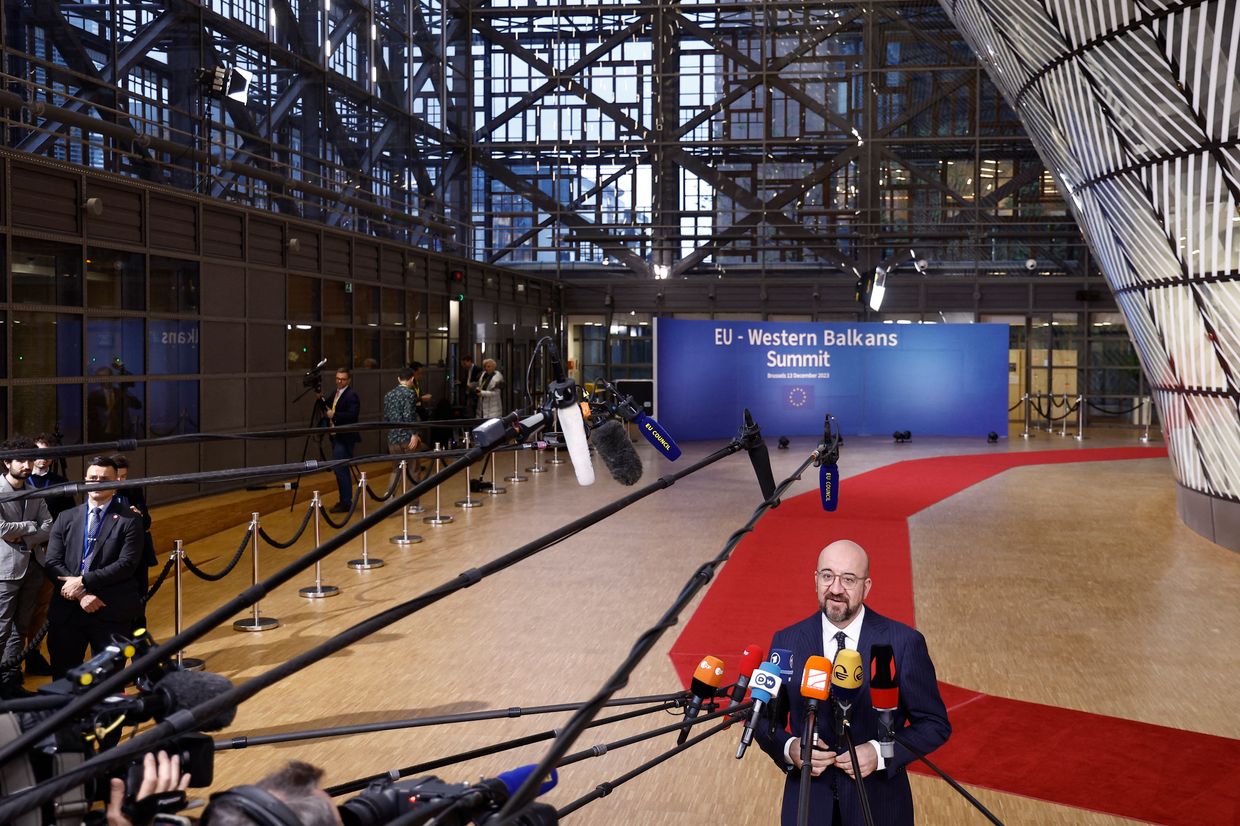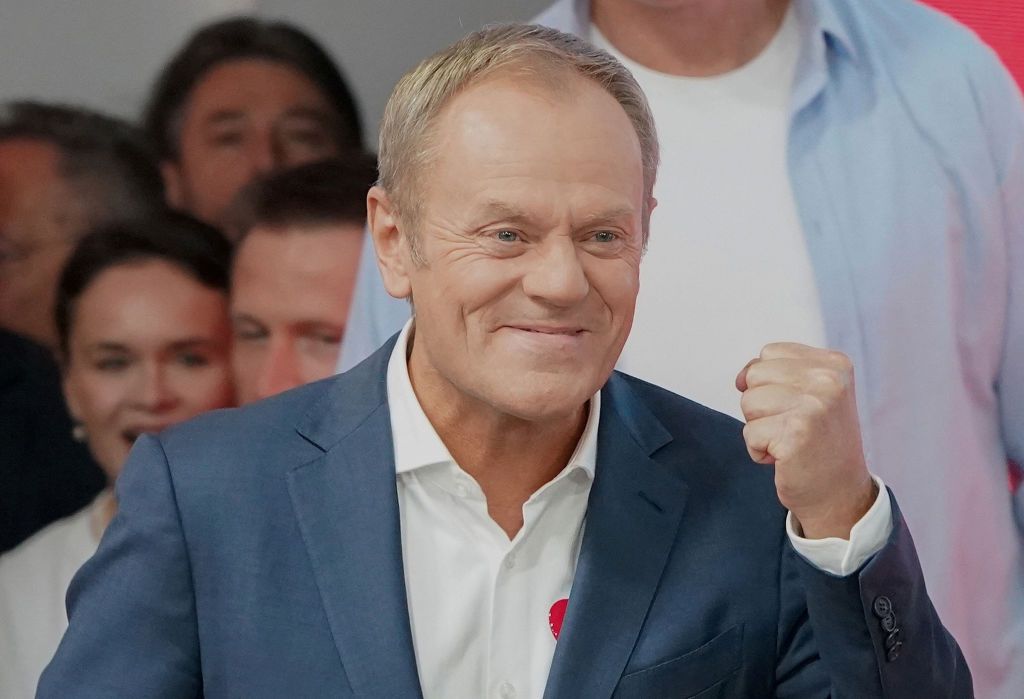Tusk's return brings stability to relations with Ukraine, but economic challenges persist

The new Polish government, led by Donald Tusk, officially took office on Dec. 13, marking the end of the eight-year rule of the conservative Law and Justice (PiS) party.
Tusk, who previously served two consecutive terms until 2014, returned with a commitment to mend Warsaw's ties with the EU and ease tensions with Kyiv, strained by conflicts over a grain embargo and a border blockade.
While Tusk's comeback is seen as a potential source of stability for Ukraine, the ongoing economic disputes between Kyiv and Warsaw are expected to persist.
Heading a broad alliance comprising the liberal-centrist Civic Coalition (KO), the center-right Third Way coalition, and the Left, the new prime minister must navigate diverse opinions within his coalition where some view Ukraine as an economic competitor.
Return to stability
In his inaugural address to the parliament, the newly-elected prime minister left no room for doubt on his stance on supporting Ukraine in the midst of the all-out war with Russia.
"We will ... loudly and decisively demand the full mobilization of the free world, the Western world, to help Ukraine in this war," Tusk said when presenting his vision for Poland's future trajectory.
The speech was well received in Ukraine at a time when there's a growing hesitancy among allies to provide further aid and a stagnant front in the country's east.
Admittedly, Warsaw's support on the military-strategic level has consistently been strong.
Michal Lebduska, an analyst at the Association for International Affairs (AMO), told the Kyiv Independent that support for Ukraine is a matter of near consensus within the Polish society and would have continued under either the PiS's or the KO's leadership.
Yet, the relationship between Poland and Ukraine has faced strain in recent months due to conflicts over grain imports and, more recently, a border blockade initiated by Polish carriers concerned about competition from Ukraine.
Two weeks prior to assuming the top job, Tusk criticized the Law and Justice (PiS) party's Ukraine strategy, calling it fatal, unprofessional, and cynical.
In turn, PiS leader Jaroslaw Kaczynski accused Tusk of being a "German agent."
While emphasizing his commitment to defending Polish interests, even in dealings with Kyiv, the newly-elected prime minister pledged to bring a much-needed element to Polish-Ukrainian relations: stability.
Veteran politician Radoslaw Sikorski, who served as Poland's defense minister from 2005 to 2007 and led the country's diplomacy from 2007 to 2014, returns as foreign minister.
The appointment of an experienced diplomat with good ties with the U.S., EU and Ukraine underscores the new government's approach to foreign policy matters, said Lebduska.

Another crucial appointment is Pawel Kowal, the newly designated head of the parliament's foreign affairs committee.
Despite being considered one of the more conservative members of KO and having previous associations with PiS, Kowal maintains robust ties with Ukraine.
He sat on the European Parliament's EU-Ukraine Parliamentary Cooperation Committee and led the parliament's monitoring mission during the 2010 Ukrainian presidential elections.
Ukrainian journalist and political analyst Olena Babakova said Kowal's personal sympathies toward Ukraine could introduce a "cordial component" into bilateral relations.
Tusk's individual role should not be underestimated either.
With a commitment to supporting Ukraine's EU aspirations and his prior position as the European Council president, Tusk wields considerable influence in Brussels.
While the new government may have limited time to impact the upcoming European Council meeting on Dec. 14 and 15, Ukraine is set to receive a loud voice in support of opening accession talks.
Finally, the new government is more likely to tone down historical grievances between the two countries, such as the Volyn massacre committed by Ukrainians during WWII.
These topics are sure not to disappear from the public space completely. Still, Tusk's government is unlikely to leverage them for political aims as the past governments have, Lebduska said.
On grain and transport, challenges remain
In contrast to foreign policy or military cooperation, the economic relations between Ukraine and Poland are considerably more complex.
Tusk's return to power occurred during a strained period in Polish-Ukrainian ties, and his new government inherited multiple challenges.
Polish carriers have been blocking the movement of trucks at several border crossings with Ukraine since November, protesting the EU's cancelation of transit permits for Ukrainian truckers.
Another unresolved issue is the grain trade, which, despite fading from public eye after the elections, remains unsettled, with Polish farmers participating in protests at the border.
During his speech in parliament, Tusk vowed to resolve the month-long border crisis and to "meet the needs of Polish truckers as soon as possible and immediately unblock the border."
Despite the likelihood of a reduction in public confrontations, Ukraine should not anticipate smoother negotiations on economic matters.
Even Ukrainian officials concede that in economic domains like agriculture, the two Kyiv and Warsaw are competitors. This competitive aspect is a fundamental consideration for any government in Warsaw.

Tusk criticized the PiS government for adopting a "radically pro-Ukrainian position" at the onset of the full-scale war, accusing then Prime Minister Mateusz Morawiecki of neglecting Polish interests.
Tusk now faces the challenge of navigating diverse voices within his broad coalition, with some expressing concerns about Ukraine's competitive grain and services.
Michal Kolodziejczak, the founder of Agrounia, one of KO's member parties, openly supported the blockade at the Medyka crossing on the Ukrainian-Polish border.
Despite the change in leadership, there is unlikely to be a significant shift in Poland's policy regarding Ukrainian grain imports, said Jan Pieklo, Poland's former ambassador to Ukraine.
Pieklo added the political significance of considering farmers' interests, represented not only by Agrounia but also by the conservative Polish People’s Party (PSL), which leads the agriculture ministry in the new government.
Pawel Zalewski from the Poland 2050 movement, PSL's Third Way partner, indicated a cautious approach to lifting the embargo on grain imports.
For Tusk, finding a compromise on these economic disputes is essential to distance his government from the internationally tainted image of the PiS.
Some KO members propose focusing on developing the transit of Ukrainian grain through Polish territory to support Ukraine and access EU funds without directly threatening Polish farmers.
This approach aligns with initiatives supported by the previous PiS government.
The new prime minister will have to walk a fine line on economic disputes with Ukraine to establish his image as a reliable partner to the EU and Ukraine while taking heed of the Polish electorate.
Now, as a strong opposition, the Law and Justice is poised to capitalize on any perceived concessions to Kyiv or Brussels made by the newly appointed prime minister.














